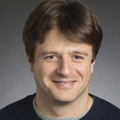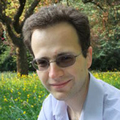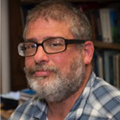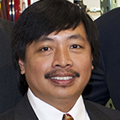Personal Mention


 Mathematician Boris Bukh, physicist Raphael Flauger and computer scientist Ariel Procaccia (l-r) are recipients of 2015 Sloan Research Fellowships. They are among 126 early-career scientists and scholars from 57 colleges and universities in the United States and Canada who will receive $50,000 to further their research.
Mathematician Boris Bukh, physicist Raphael Flauger and computer scientist Ariel Procaccia (l-r) are recipients of 2015 Sloan Research Fellowships. They are among 126 early-career scientists and scholars from 57 colleges and universities in the United States and Canada who will receive $50,000 to further their research.
- Bukh, an assistant professor in the Mathematical Sciences Department, studies the interface of combinatorics, geometry and number theory, with the goal of applying combinatorial ideas to geometry.
- Flauger, an assistant professor in the Physics Department and member of the McWilliams Center for Cosmology, studies phenomenological questions in cosmology and particle physics, and formal questions in field theory, string theory and quantum gravity.
- Procaccia, an assistant professor in the Computer Science Department, studies artificial intelligence, focusing on the use of social choice and game theory for resource allocation and collective decision-making.

 The American Society of Civil Engineers (ASCE) Pittsburgh Chapter has recognized College of Engineering Dean James H. Garrett, Jr. and Professor Mitchell Small (l-r) as its 2014 Civil Engineer of the Year and Professor of the Year, respectively.
The American Society of Civil Engineers (ASCE) Pittsburgh Chapter has recognized College of Engineering Dean James H. Garrett, Jr. and Professor Mitchell Small (l-r) as its 2014 Civil Engineer of the Year and Professor of the Year, respectively.
- Garrett’s research and teaching have focused on applying advanced computing and information technologies to civil engineering problems. His research interests have included applications of sensors and sensor systems to civil infrastructure condition assessment; mobile hardware/software systems for field applications; representations and processing strategies to support the usage of engineering codes, standards and specifications; and knowledge-based decision support systems.
- Small was recognized for his engaging style in teaching students how quantitative analysis can bring deep insight and predictive ability to engineering problems, design, and policy formulation and analysis.He equips students with quantitative tools in statistical modeling and process modeling that enable them to excel in practice, academia and government. Small’s book, titled “Integrated Environmental Modeling: Pollutant Transport, Fate and Risk in the Environment,” has been adopted by instructors in environmental engineering and science programs across the U.S.
 Herman Herman (right) is succeeding Anthony Stentz as director of CMU's National Robotics Engineering Center (NREC). Herman has been a principal commercialization specialist at NREC for eight years, focusing on robotic system design and integration. His work is central to NREC's mission, which is to mature robotics technologies into relevant, field-tested systems and transfer them for commercialization. Herman has developed numerous robotic vehicles and sensor suites for defense and commercial applications, including robotics mine-detection systems and vision-based intelligent sensors for agricultural applications. He is the perception hardware and electronics lead for the Tartan Rescue Team, NREC's entry in the DARPA Robotics Challenge. Stentz steps down after 18 years as director of the NREC. He has been a faculty member at the Robotics Institute for 25 years and will remain a regular member of the CMU faculty. After a transition period at NREC — during which he will continue leading efforts toward the DARPA Robotics Challenge and other project work — he plans to take an academic leave of absence from the university to pursue a new technical opportunity. Learn more.
Herman Herman (right) is succeeding Anthony Stentz as director of CMU's National Robotics Engineering Center (NREC). Herman has been a principal commercialization specialist at NREC for eight years, focusing on robotic system design and integration. His work is central to NREC's mission, which is to mature robotics technologies into relevant, field-tested systems and transfer them for commercialization. Herman has developed numerous robotic vehicles and sensor suites for defense and commercial applications, including robotics mine-detection systems and vision-based intelligent sensors for agricultural applications. He is the perception hardware and electronics lead for the Tartan Rescue Team, NREC's entry in the DARPA Robotics Challenge. Stentz steps down after 18 years as director of the NREC. He has been a faculty member at the Robotics Institute for 25 years and will remain a regular member of the CMU faculty. After a transition period at NREC — during which he will continue leading efforts toward the DARPA Robotics Challenge and other project work — he plans to take an academic leave of absence from the university to pursue a new technical opportunity. Learn more.
Waleed Ammar, a Ph.D. student in the Language Technologies Institute (LTI), and Justin Meza, a Ph.D. student in the Electrical and Computer Engineering Department, are among 15 graduate students from across North America to be chosen as 2015 Google Ph.D. fellows. The two-year fellowship includes tuition, fees and a yearly stipend.
- Ammar, who is advised by the LTI’s Noah Smith and Chris Dyer, will receive the Google US/Canada Fellowship in Natural Language Processing. His research includes work on conditional random field autoencoders, a family of models that uses unlabeled data for learning structured predictors in natural language processing.
- Meza has received the 2015 Google Fellowship in Systems Reliability. Meza’s reliable systems work focuses on solving two problems: Why do memory and storage devices fail? And, what can we do to prolong their usable lifetime? To answer these questions, Meza is performing large-scale characterizations of the reliability of memory and storage devices in large-scale data centers and discovering new trends in device reliability that can be used to design more resilient devices and systems.
Kevin Fall, CTO for the Software Engineering Institute (SEI), published a blog post highlighting the SEI's five-year, technical strategic plan, which aims to equip the Department of Defense (DoD) and other federal agencies with the best combination of thinking, technology, and methods to address its software and cybersecurity challenges. The DoD and other government agencies increasingly rely on software and networked software systems. As one of over 40 federally funded research and development centers sponsored by the United States government, the SEI is working to help the government acquire, design, produce, and evolve software-reliant systems in an affordable and secure manner. The quality, safety, reliability, and security of software and the cyberspace it creates are major concerns for both embedded systems and enterprise systems employed for information processing tasks in health care, homeland security, intelligence and logistics. Cybersecurity risks, a primary focus area of the SEI’s CERT Division, regularly appear in news media and have resulted in policy action at the highest levels of the US government. Read the post.
Lowell Taylor, professor of economics and public policy at the Heinz College, is being featured in the lead article on The American Economic Review for a study he co-authored that found that mortality rates increased by 40 percent for black men and 50 percent for black women who fled the dangers and discrimination of the Jim Crow South in search of better lives. Common causes of death for the migrants included cardiovascular disease, lung cancer, and cirrhosis — all linked to bad habits like smoking and drinking. The stress caused by racism in the North, being forced to live in overcrowded neighborhoods, and being underpaid for the work they were doing led many to smoke and drink, thus shortening their lives. The study's findings contradict a common assumption among economists that more education and wealth automatically benefit one's health. Read the paper, “The Impact of the Great Migration on Mortality of African Americans: Evidence from the Deep South.”
Shawn Litster, associate professor of mechanical engineering, was the corresponding author of a study published in the Journal of Power Sources. His research team used nano-CT in the 3-D imaging of lithium ion battery cathodes, a method that could provide a better understanding of the electric current distribution and structural integrity of battery electrodes, as well as provide detailed geometries for computational models. Litster runs the Laboratory for Transport Phenomena in Energy Systems. Read the article.
 Po-Shen Loh (right), an assistant professor of mathematical sciences, received an NSF CAREER Award. The Faculty Early Career Development (CAREER) Program offers the National Science Foundation's most prestigious awards in support of junior faculty who exemplify the role of teacher-scholars through outstanding research, excellent education and the integration of education and research within the context of the mission of their organizations. Loh's research lies at the intersection of combinatorics and probability theory. He uses randomness as a component in the construction of discrete mathematical objects and also introduces randomness as a proof technique to solve problems about purely deterministic systems. Some of Loh's work is motivated by problems from computer science. He is affiliated with Carnegie Mellon's interdisciplinary Ph.D. program in Algorithms, Combinatorics and Optimization and has developed an innovative problem-solving seminar series for undergraduate students, inspired by the annual Putnam exam.
Po-Shen Loh (right), an assistant professor of mathematical sciences, received an NSF CAREER Award. The Faculty Early Career Development (CAREER) Program offers the National Science Foundation's most prestigious awards in support of junior faculty who exemplify the role of teacher-scholars through outstanding research, excellent education and the integration of education and research within the context of the mission of their organizations. Loh's research lies at the intersection of combinatorics and probability theory. He uses randomness as a component in the construction of discrete mathematical objects and also introduces randomness as a proof technique to solve problems about purely deterministic systems. Some of Loh's work is motivated by problems from computer science. He is affiliated with Carnegie Mellon's interdisciplinary Ph.D. program in Algorithms, Combinatorics and Optimization and has developed an innovative problem-solving seminar series for undergraduate students, inspired by the annual Putnam exam.
